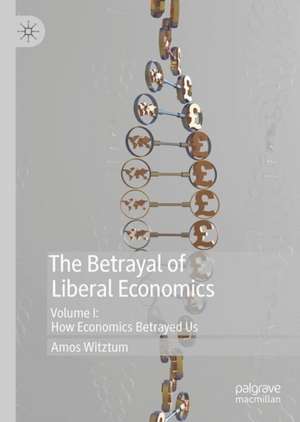The Betrayal of Liberal Economics
Autor Amos Witztumen Limba Engleză Hardback – 6 iun 2019
This multi-book set includes both Volumes of The Betrayal of Liberal Economics by Amos Witztum.
The presumed sovereignty of individuals and the facilitating powers of the markets have generated a universal and ethically neutral conception of both social and economic organisation. This ground-breaking text re-examines the purpose of society and the role of economics in it, arguing that the absence of a beneficial natural order calls for the role of the collective in social and economic life to be revisited. Drawing on some key figures marking milestones in the evolution of social and economic thinking, the author offers a critique of mainstream economics as a way of thinking and as a provider of guiding principles for economic and social organisation.
Whilst Volume I looks at how economics’ paradigmatic core betrayed us by its false promise, Volume II begins to consider whether the current status quo may in fact be a result of the way in which the academic community have instead betrayed economics. Starting with an exploration into the nature of human sociality and what the notion of the ‘individual’ means in both liberal classical and modern economics, the author moves on to address the organisational implications of these conclusions using the concept of ‘social distance’. He then considers whether modern economics can accommodate such sociality whilst maintaining the same organisational principle of competitive decentralisation as the universal recipe for economic organisation. The text concludes by examining whether the fault can be found in the misconception of modern economics as a linear intellectual progression from liberal classical economics. This is done through a novel re-examination of liberal classical economics by developing Adam Smith’s theory to answer such questions.
This is a bold and foundational new work that offers an original and innovativeperspective on economics and its challenges, addressing core areas such as behavioural economics, evolutionary game theory and links between social sciences (anthropology, philosophy) and neurosciences.
| Toate formatele și edițiile | Preț | Express |
|---|---|---|
| Hardback (3) | 208.35 lei 3-5 săpt. | +39.34 lei 6-10 zile |
| Springer International Publishing – 29 apr 2019 | 208.35 lei 3-5 săpt. | +39.34 lei 6-10 zile |
| Springer International Publishing – 29 apr 2019 | 300.43 lei 3-5 săpt. | |
| Springer International Publishing – 6 iun 2019 | 408.63 lei 3-5 săpt. | +63.01 lei 6-10 zile |
Preț: 408.63 lei
Nou
Puncte Express: 613
Preț estimativ în valută:
78.19€ • 85.20$ • 65.89£
78.19€ • 85.20$ • 65.89£
Carte disponibilă
Livrare economică 02-16 aprilie
Livrare express 18-22 martie pentru 72.100 lei
Preluare comenzi: 021 569.72.76
Specificații
ISBN-13: 9783030112431
ISBN-10: 3030112438
Pagini: 634
Ilustrații: XX, 815 p. 107 illus. 2 volume-set.
Dimensiuni: 155 x 235 x 57 mm
Greutate: 1.32 kg
Ediția:2019
Editura: Springer International Publishing
Colecția Palgrave Macmillan
Locul publicării:Cham, Switzerland
ISBN-10: 3030112438
Pagini: 634
Ilustrații: XX, 815 p. 107 illus. 2 volume-set.
Dimensiuni: 155 x 235 x 57 mm
Greutate: 1.32 kg
Ediția:2019
Editura: Springer International Publishing
Colecția Palgrave Macmillan
Locul publicării:Cham, Switzerland
Cuprins
1. An Illusion of Order.- 2. The Power of Beliefs: The Organisational Principles of Economics' Paradigmatic Core.- 3. A Sense of Irrelevance.- 4. On Freedom and Justice: A Note Pertaining to Economics' Liberal Connection.- 5. On Human Sociality I.- 6. On Human Sociality II: Intrinsic Sociality, Self-Interest and Social Organisation.- 7. The Conception of the Individual in Modern Economic Analysis.- 8. The Classical Alternative.- 9. Epilogue: Quo Vadis.
Notă biografică
Amos Witztum is a professor of economics who is currently a Research Associate at the Centre for the Philosophy of Natural and Social Sciences at the London School of Economics and Political Sciences, UK.
Caracteristici
Presents an innovative challenge to mainstream economics questioning both its validity and relevance as a social theory Introduces original research based on other disciplines to formulate an alternative conceptual framework for economic analysis Seeks to re-establish economics as a genuine social discipline which is more in line with classical economics from which modern economics has been a dramatic and unwarranted departure
